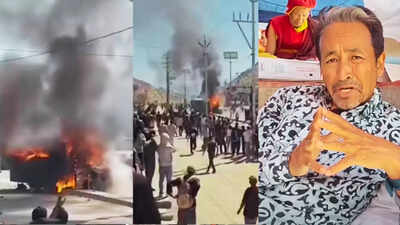
Evil Scientist Exposed: Sonam Wangchuk at the Center of Leh Violence
Leh, Ladakh, is in turmoil after massive protests demanding statehood and Sixth Schedule protection spiraled into widespread violence. What began as a peaceful movement led by environmentalist and education reformer Sonam Wangchuk has now turned into one of the most volatile political flashpoints in the region’s recent history.
Wangchuk, celebrated globally for his innovation and activism, began a 15-day hunger strike on September 10 to draw attention to Ladakh’s political and environmental issues. His campaign initially inspired thousands across the region. But as frustration grew among Ladakh’s youth, the protests took a darker turn, exploding into anger and destruction once Wangchuk’s strike ended.
On September 24, chaos gripped the streets of Leh. A BJP office and a police vehicle were set on fire, and stone-pelting mobs clashed with security forces. Shops were shut, roads were blocked, and police were forced to deploy tear gas and baton charges to regain control. Authorities have since imposed strict curfews and brought in reinforcements to contain the unrest.
Wangchuk has publicly expressed disappointment over the violence, claiming his original message of non-violence had been “hijacked.” However, critics argue that his fiery rhetoric and calls for mass mobilization set the stage for the explosive confrontations. Some political voices are now branding him the “evil scientist” behind the movement — a figure who experimented with peaceful protest but unleashed forces he could no longer control.
High-level talks between Ladakh leaders — including the Ladakh Buddhist Association (LAB) and Kargil Democratic Alliance (KDA) — and the Central government are scheduled for October 6. These talks will determine whether Ladakh moves toward greater autonomy or sinks further into unrest.
For now, Leh remains on edge. Sonam Wangchuk’s once-inspiring campaign for environmental protection and local rights has morphed into a regional crisis, leaving many to question whether his leadership was a visionary fight for justice — or a dangerous experiment gone wrong.
